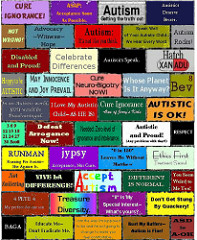General kvetching here, mostly related to the large number of idiots who feel the need to–
I’ll get to that in a minute. You ever feel so annoyed and stressed that your brain functioning gets crispy around the edges? I hate driving around strange cities, especially when I’m looking for parking places. It’s hard navigating unfamiliar streets and trying to read the signs and watch for passengers and watch for traffic and figure out how to get somewhere despite the one-way streets and angled streets and dead-end streets that confound my passage. I was stymied by streets that were closed for construction, and I found no less than four of them in this small area that was both experiencing both road repairs and the rehabbing of several old buildings. So many unfamiliar things to be aware of — it was like being a student driver all over again.
By the time I rejoined my kids at the hotel lobby, my head hurt, my eyes had that “screwed in too tight” feeling (like when you first put on a stronger pair of glasses), I was randomly mispronouncing words, and was taking wrong turns down hallways. Sitting around a hotel lobby and crayoning butterflies in my new coloring book was just what I needed to decompress.
It was the eldest’s birthday. We went to a museum, had lunch and went to some specialty shops, hung out at the hotel lobby to rest a bit, then went out to eat at a nice restaurant. All these places were within the same square mile. I figured I would drive down to the city, find a parking spot, enjoy the day, and then drive home.
I couldn’t find my sunglasses before leaving the house, and it was really bright. Then I couldn’t find a place to park. The parking in front of the museum is the short-term variety with coin meters, so I look for street parking, find myself in all the wrong lanes, finally give up on that, drop passengers off at the museum, and then go in pursuit of the multi-storey car park nearby.
Next thing I know people are calling me because I needed to already be there at the museum for the ticket time. I’d spent literally half an hour trying to get around a block to the correct turn-off into that multi-storey car park, and then cruising circuitiously within the structure looking for an empty spot that wasn’t either reserved for post office workers, or rendered functionless by sloppy parking.
Because Yes, an alarmingly large percentage of the people parked in that car park feel they need Sport-Utility Vehicles. Not to navigate muddy, rocky pastures, nor to carry equipment through washed-out country roads, nor make deliveries up the rutted gravel side roads of mountain foothills, but to cruise around the rugged terrain of paved city streets to offices, schools and shops. Older, crowded, downtown metropolitan streets, where the lanes are squeezed by parallel parking.
The old urban streets are narrow, and the parking spaces in such areas are also necessarily narrow. But an alarmingly large number of people drive SUVs that don’t really fit the given parking spaces. A surprising number of them end up in that multi-storey car park, with a pair of wheels over the line into the next parking spot. Some of the drivers are either so paranoid about their paint, so uncertain in their driving skills, so inconsiderate, or feel so entitled that they simply straddle the dividing line (centered over it) and use two whole parking spaces for their single oversized vehicle.
Polysyllabic expletive! There I am, part of a line of vehicles circling the structure, looking for available spots. We drive along one side and then the other, slowly cruising up level after level in our pursuit of parking. My Beetle is dwarfed by these overbuilt, gasoline-gulping, fat-arsed vehicles with their passenger windows that looked down upon my sunroof. I finally park and rejoin the family.
Then after the museum tour, I am in the queue of vehicles waiting to go through the ticket gate to exit the pricey car park. To my passenger side is an empty spot, and I pause to let an oncoming vehicle turn in. The driver of the SUV turns to go across my lane into the parking spot — and then they realise that they are not going to make it at that angle and stop.
They back up, and re-angle again to fit into the parking space.
Then they back up a second time, and re-angle a third time to fit into the parking space.
And even after that, they are still not parked between the divider lines.
Once finally positioned, agitated squawking ensues from inside the vehicle as the passengers do not have enough room to open the door and get out! Meanwhile, the line of cars ahead of me had advanced, so I do too — obviously this driver needs space to manoeuver. (I assume that everyone either crawled over to the driver’s side to exit, or they gave up and re-parked it elsewhere.)
Back when I learned to drive, we probably would have called such a manoeuver a “4-point turn”, meaning having to stop and change the direction four times. Then again, we didn’t even make such manoeuvers; we only did 3-point turns in lieu of U-turns when on narrow roads.
Slowly waiting for my turn at the ticket gate, I passed yet another such monster. (The queue was really slow, hence time to take snaps.) This SUV driver had backed the vehicle into the parking spot, which is no small trick. Even so, they still were not centered between the lines. (Maybe the vehicle that had been on their passenger side had also strayed over the divider line.)
Apparently the owner of the black car to the right of the SUV had come by and parked later, because it was centered within its parking lane divider lines. I’m assuming that the black car’s driver was able to open their door enough to slide out, but it must have been a tight squeeze.
It took me a freaking HOUR to move my car from a pay-per-hour multi-storey car park by the museum to a free car park at the nearby restaurant where we would be dining. I knew where I needed to be — I could see the restaurant. I knew where I was (I wasn’t lost) — I just could not get from where I was to where I wanted to be! I probably travelled four or five miles, but when all was said and done, had effected a vector change of a whopping quarter-mile northward.
So why was I driving around this large metropolitan area in pursuit of parking? It’s not that I prefer driving — I would rather be riding a subway or light-rail. It’s because the public transit system in Big City sucks. No one can get the funds to develop a more viable mass-transit because too many people prefer their cars.
(These digital photos were not manipulated other than to correct for lighting and to white out the license plates for the owner’s privacy. But it doesn’t really matter where the photos were taken — those damn SUVs are EVERY-freaking-WHERE.)














